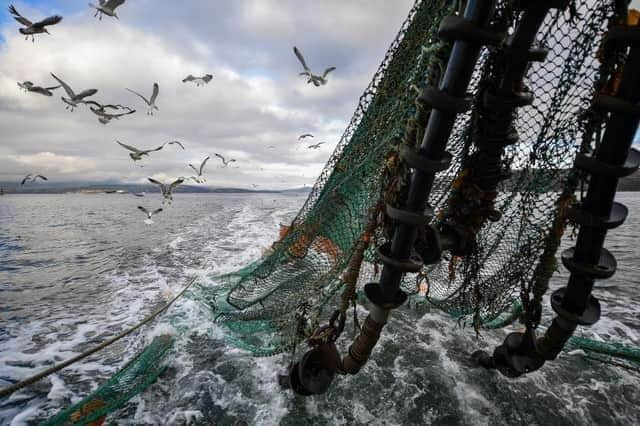Opportunity for new fish quota fairness


A sharp divergence of views has emerged on how additional quota mainly for the pelagic catching sector, resulting from the UK’s withdrawal from the EU, should be distributed – a decision devolved by the UK Government to Edinburgh in respect of Scottish waters.
In response to a consultation paper, the Western Isles Fishermen’s Association has argued strongly against “using a historic track record system” which would result in current mega-quota holders – in Shetland and north-east Scotland - being handed even more, to the exclusion of “fragile coastal communities that are adjacent to these quotas”.
Advertisement
Hide AdAdvertisement
Hide AdComhairle nan Eilean Siar has described the emergence of Additional Quota as a “rare opportunity” for more equitable distribution and says that to hand all or most of it to the existing Scottish pelagic fleet would be “extremely unfair”.
Duncan Macinnes, secretary of the WIFA and deputy leader of the Comhairle, told the Gazette that a pelagic and white fish catching and processing effort could be restored over a few years, allowing fishermen to diversify from reliance on shellfish landings which are under intense pressure from environmental restrictions.
Mr Macinnes urged the Scottish Government to retain ownership of the Additional Quota and allocate it to community quota holders, rather than “privatise it by handing it over to multi-millionaires who would then retain it in perpetuity”.
There is already “community quota” in Orkney and Shetland bought with “oil money” – an option which has never existed in the Western Isles although the Comhairle has invested successfully in prawn quota which local fishermen can lease.
Advertisement
Hide AdAdvertisement
Hide AdMr Macinnes said: “The Scottish Government describe quota as a national asset. So why should they turn it into a. private asset, which is what all the other quota has become?”.
The WIFA submission said: “Distribution of additional quota on historic track records will not provide an opportunity for coastal communities to diversify from their current high dependency on shellfish stocks. Furthermore, historic track records will close the door on new entrants coming into the industry”.
It continued: “Distribution by historic track record will result in those already having access to a National Resource continuing to benefit financially from a resource that will remain in ownership of a small number of wealthy Scottish operators, rather than remote coastal communities having the opportunity of a gradual rebuilding and diversification”.
Recalling relevant history, the submission states: “Pelagic and white fish landings into the Western Isles prior to joining the EU accounted for over 90 per cent by volume and over 80 per cent by value, whilst pelagic and white fish landings are now at under one per cent.
Advertisement
Hide AdAdvertisement
Hide Ad“This clearly illustrates that areas like the Western Isles have lost the most in pelagic and white fisheries and should now gain most from Additional Quota. The distribution of the AQ should be considered on a Levelling Up basis to assist areas that have suffered the most since joining the EU.
“Many of those are remote fragile communities that could have fleet and infrastructure developed, provided a phase-in period of 5 – 10 years was considered to allow development of the necessary infrastructure to catch additional quota (which) should be managed to achieve maximum social and economic benefit to communities based on sustainable methods of catching”.
The submission argues that quota being available to small vessels would allow them to diversify from current high dependency on shellfish stocks at a time of year when shellfish prices are lower.
“Landing of white fish and pelagic would be done on a daily basis with high quality fish landed from selective methods and all landed and processed in Scotland, which may not be the case with larger vessels capable of catching large volumes to land in non-Scottish ports”.
Advertisement
Hide AdAdvertisement
Hide AdThe Comhairle response says allocating the Additional Quota to more fragile coastal areas would “result in a more equitable spread of the socioeconomic benefits arising from Scotland’s quota and encourage the use of fishing gear with a lower environmental impact. Under 10m vessels methods are often associated with higher selectivity, reduced by-catch of fish species and a lower impact on the marine environment”.
If Additional Quota was distributed to community quota schemes, the Comhairle argues, “it would have a huge impact on the fishing industry on a local level and result in more diversification and regional reinvestment in much needed infrastructure”.
However, it continues: “The Scottish Government states that it does not intend to use this methodology as a form of distribution due to the potentially significant administrative and financial costs associated with doing so. … Given the overwhelming benefits such schemes could have, this is considered a disappointing position to take on such a rare opportunity”.
The Comhairle response continues: “This consultation represents a real opportunity to redistribute fish stock quotas more equitably and for the enhancement of local fishing industries on the whole. This is also a rare opportunity to issue quota to parts of our fishing industry that may not get the opportunity to access it again.
Advertisement
Hide AdAdvertisement
Hide Ad“The current pelagic fleet in Scotland is disproportionately advantaged in comparison to the rest of the fishing fleet - and to issue that sector with the vast majority of Additional Quota from 2024 would be considered extremely unfair”.